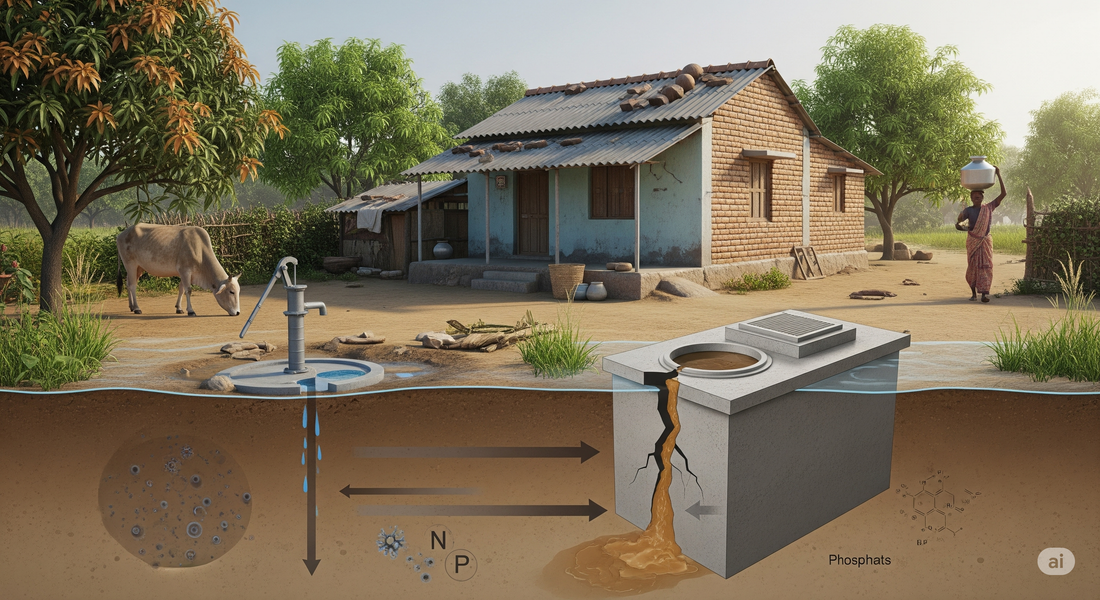अपने सेप्टिक टैंक से भूजल संदूषण को कैसे रोकें?

सेप्टिक टैंक का भूजल प्रदूषण एक गंभीर खतरा है—और सही सेप्टिक टैंक क्लीनर आपको इससे बचाव में मदद कर सकता है। हर दिन, आपका परिवार टूटे हुए या ज़रूरत से ज़्यादा भरे सेप्टिक सिस्टम से रिसने वाले अनुपचारित अपशिष्ट से दूषित पानी पी सकता है। इन अदृश्य प्रदूषकों में खतरनाक बैक्टीरिया और रसायन होते हैं जो आपको बेहद बीमार कर सकते हैं। एक विश्वसनीय सेप्टिक टैंक क्लीनर के उचित उपयोग और नियमित रखरखाव के बिना, आप अपने घर को दूषित जल से होने वाली बीमारियों के संपर्क में आने का जोखिम उठाते हैं जो दुर्लभ तो हो सकती हैं लेकिन संभावित रूप से जानलेवा हो सकती हैं।
सेप्टिक टैंक भूजल संदूषण
भूजल संदूषण तब होता है जब हानिकारक पदार्थ भूमिगत जल आपूर्ति में रिस जाते हैं। सेप्टिक टैंक, अगर ठीक से रखरखाव न किया जाए या सही जगह पर न हों, तो अनुपचारित अपशिष्ट जल मिट्टी में रिस सकता है, जिससे खतरनाक बैक्टीरिया, वायरस और रसायन भूजल में प्रवेश कर सकते हैं। चूँकि कई घर पीने के लिए भूजल पर निर्भर हैं, इसलिए संदूषण जन स्वास्थ्य के लिए सीधा खतरा पैदा करता है।
सेप्टिक सिस्टम ठोस पदार्थों को अलग करके और बैक्टीरिया को अपशिष्ट को प्राकृतिक रूप से विघटित करने की अनुमति देकर अपशिष्ट जल के उपचार के लिए डिज़ाइन किए गए हैं। लेकिन जब टैंक क्षतिग्रस्त, अतिभारित या गलत तरीके से रखे जाते हैं, तो वे विफल हो सकते हैं। इस विफलता के कारण कैम्पिलोबैक्टर जेजुनी जैसे सामान्य जलजनित बैक्टीरिया जैसे रोगजनक भूजल स्रोतों में पहुँच जाते हैं और कुओं और पेयजल आपूर्ति को दूषित कर देते हैं।
हालांकि दूषित भूजल अक्सर जठरांत्र संबंधी संक्रमण का कारण बनता है, लेकिन इसके खतरे कहीं ज़्यादा गहरे हैं। जलजनित बैक्टीरिया से जुड़ी एक गंभीर स्वास्थ्य स्थिति है गिलियन-बैरे सिंड्रोम (जीबीएस) , जो एक दुर्लभ स्व-प्रतिरक्षी विकार है जिसमें प्रतिरक्षा प्रणाली तंत्रिकाओं पर हमला करती है, जिससे मांसपेशियों में कमज़ोरी और लकवा होता है।
अध्ययनों से पता चलता है कि खराब स्वच्छता और अनुपचारित जल वाले क्षेत्रों में जलजनित संक्रमणों और जीबीएस के मामलों की दर अधिक होती है। विश्व स्वास्थ्य संगठन के अनुसार, असुरक्षित जल से जुड़ी दस्त संबंधी बीमारियों से हर साल लाखों मौतें होती हैं , जिनमें से कई जीबीएस जैसी जटिलताओं को जन्म दे सकती हैं।
सेप्टिक टैंकों से भूजल प्रदूषण के प्रमुख कारण
सेप्टिक टैंक से होने वाले भूजल प्रदूषण के मुख्य कारणों के बारे में जागरूकता इसकी रोकथाम का पहला कदम है। कई कारण, अक्सर सिस्टम के उपयोग, डिज़ाइन और रखरखाव से संबंधित समस्याएँ, रिसाव और प्रदूषण का कारण बन सकती हैं।
सेप्टिक टैंकों द्वारा भूजल संदूषण के सामान्य कारण:
- सेप्टिक टैंकों का खराब या अपर्याप्त रखरखाव
- दोषपूर्ण या पुराने सेप्टिक सिस्टम घटक
- जल स्रोतों के पास गलत स्थापना या स्थान
- भारी अपशिष्ट या पानी से सेप्टिक प्रणालियों का अतिभारित होना
- अच्छे बैक्टीरिया को मारने वाले भारी रसायनों का उपयोग
- गैर-जैवनिम्नीकरणीय अपशिष्ट और ग्रीस का निपटान
- क्षतिग्रस्त या टूटे हुए सेप्टिक टैंक और पाइप
- दोषपूर्ण जल निकासी या मिट्टी की पारगम्यता
- सेप्टिक सिस्टम घटकों पर जड़ों का आक्रमण
- बाढ़ या उच्च जल स्तर प्रणाली को प्रभावित करते हैं
भूजल प्रदूषण आमतौर पर तब शुरू होता है जब सेप्टिक सिस्टम की उपेक्षा की जाती है या उसका डिज़ाइन खराब होता है। टैंकों के फटने और पाइपों के जाम होने से मिट्टी अनुपचारित अपशिष्ट जल से दूषित हो जाएगी।
अतिरिक्त पानी सिस्टम पर अत्यधिक दबाव डाल सकता है, जिससे अपशिष्ट निष्कासन की क्षमता कम हो जाती है। शौचालयों में बहाए जाने वाले हानिकारक रसायन और उत्पाद नियमित अपघटन को बाधित कर सकते हैं, जिससे प्रदूषकों के भूजल तक पहुँचने की संभावना बढ़ जाती है।
कुओं या जलाशयों के पास अपर्याप्त स्थान होने से भी दूषित पदार्थों का पेयजल स्रोतों में पहुँचना आसान हो जाता है। इन सामान्य समस्याओं को समझने से घर के मालिकों को यह पता लगाने में मदद मिलती है कि उन्हें क्या ढूँढना है और पानी की गुणवत्ता बनाए रखने के लिए पहले से ही उपाय करने में मदद मिलती है।
भूजल प्रदूषण को रोकने के व्यावहारिक कदम
आप अपने भूजल के भाग्य के नियंत्रण में हैं - स्रोत पर प्रदूषण को रोकने के लिए अभी कार्रवाई करें। अपने घर और समुदाय की सुरक्षा के लिए इन सिद्ध, अपरिहार्य उपायों का पालन करें।
- अपने सेप्टिक टैंक का नियमित निरीक्षण और पम्पिंग करवाएँ: एक निश्चित समय-सारिणी निर्धारित करें: कम से कम हर 2-3 साल में, अपने सेप्टिक सिस्टम का पेशेवर निरीक्षण और पम्पिंग करवाएँ। ऐसा न करने पर कीचड़ जमा हो सकता है जो आपके टैंक की सुरक्षा को तोड़ सकता है और कचरा ज़मीन में रिस सकता है।
- नियमित रूप से माइक्रोबियल सेप्टिक टैंक क्लीनिंग पाउडर डालें: सिर्फ़ रखरखाव के लिए जाने पर ही निर्भर न रहें—बायोक्लीन का माइक्रोबियल सेप्टिक टैंक क्लीनर लिक्विड हर महीने या निर्देशानुसार इस्तेमाल करें। यह प्राकृतिक बैक्टीरिया को सक्रिय करता है जो ठोस पदार्थों और ग्रीस को तेज़ी से तोड़ते हैं, जिससे रुकावटें शुरू होने से पहले ही रुक जाती हैं।
- हानिकारक रसायनों और अपशिष्ट को अभी फ्लश करना बंद करें: ब्लीच, पेंट, तेल या प्लास्टिक को नालियों में फेंकने से आपके सेप्टिक टैंक के लिए ज़रूरी लाभकारी बैक्टीरिया मर जाते हैं। अपने सिस्टम को पूरी क्षमता से काम करते रहने के लिए इस आदत को तुरंत बंद कर दें।
- ओवरलोड से बचने के लिए अपने पानी के इस्तेमाल पर नियंत्रण रखें: लीकेज ठीक करें और पानी के अत्यधिक इस्तेमाल से बचें। टैंक में पानी भरने से उसकी फ़िल्टरिंग क्षमता कम हो जाती है, जिससे अनुपचारित अपशिष्ट जल के भूजल में जाने का खतरा बढ़ जाता है।
- अपने सेप्टिक सिस्टम से जड़ों और भारी सामान को दूर रखें: पेड़ों की जड़ें और वाहन टैंकों और पाइपों में दरार डाल सकते हैं। उस जगह को बाड़ लगाकर या सावधानीपूर्वक पौधे लगाकर अपने सिस्टम की सुरक्षा करें।
- सुनिश्चित करें कि आपकी सेप्टिक प्रणाली सही ढंग से और रणनीतिक रूप से स्थापित की गई है: यदि नई स्थापना या मरम्मत की आवश्यकता है, तो ऐसे पेशेवर को नियुक्त करें जो प्रणाली को कुओं और जल निकायों से दूर रखे, तथा ऐसी मिट्टी हो जो अपशिष्ट को सुरक्षित रूप से अवशोषित कर सके।
- नुकसान तुरंत ठीक करें—बिना इंतज़ार किए: कोई भी दरार, रुकावट या रिसाव संक्रमण का एक टाइम बम है। जैसे ही आपको इनका पता चले, तुरंत मरम्मत करवाएँ।
- कचरा निपटान से बचें या उसका उपयोग सीमित करें: कचरा निपटान में भारी ठोस पदार्थ शामिल होते हैं, जिन्हें आपके सिस्टम को तोड़ने में कठिनाई होती है, जिससे विफलता और संदूषण का जोखिम बढ़ जाता है।
बायोक्लीन जैसे माइक्रोबियल सेप्टिक टैंक क्लीनिंग पाउडर का इस्तेमाल करना एक अच्छा विचार है। यह आपके सिस्टम में पहले से मौजूद सेप्टिक टैंक क्लीनिंग बैक्टीरिया के साथ प्राकृतिक रूप से काम करता है, जिससे अपशिष्ट पदार्थ तेज़ी से विघटित होते हैं और रिसाव का कारण बनने वाले कीचड़ के जमाव को रोकते हैं। निर्देशानुसार इसे अपनी दिनचर्या में शामिल करें, और आपको कम समस्याएँ और सुरक्षित भूजल मिलेगा।
निष्कर्ष
इन आवश्यक कार्यों के साथ अपने सेप्टिक सिस्टम पर नियंत्रण रखें और अपने भूजल की रक्षा करें:
- रिसाव को रोकने के लिए अपने सेप्टिक टैंक को साफ और अच्छी तरह से बनाए रखें।
- अपशिष्ट को प्राकृतिक रूप से विघटित करने और कीचड़ के जमाव को कम करने के लिए बायोक्लीन जैसे माइक्रोबियल सेप्टिक टैंक सफाई पाउडर का उपयोग करें।
- सिस्टम संतुलन बनाए रखने के लिए हानिकारक रसायनों को फ्लश करने से बचें और पानी के अधिभार को सीमित करें।
बायोक्लीन सेप्टिक टैंक सफाई पाउडर आपके टैंक में प्राकृतिक जीवाणु वातावरण को बहाल करने के लिए सक्रिय रूप से काम करता है - आपके सिस्टम को कुशलतापूर्वक चलाने में मदद करता है और संदूषण के जोखिम को कम करता है।
बायोक्लीन या किसी भी अनुशंसित सेप्टिक टैंक क्लीनर तरल को आज ही अपने नियमित रखरखाव का हिस्सा बनाएं और अपने और अपने परिवार के लिए स्वच्छ, सुरक्षित भूजल सुनिश्चित करें।
पूछे जाने वाले प्रश्न
प्रश्न 1. सेप्टिक टैंक क्लीनर भूजल संदूषण को कैसे रोकता है?
सेप्टिक टैंक क्लीनर कीचड़, ग्रीस और जैविक अपशिष्ट को विघटित कर देता है, तथा अनुपचारित मलजल को भूजल में रिसने से रोकता है।
प्रश्न 2. मुझे सेप्टिक टैंक क्लीनर का उपयोग कितनी बार करना चाहिए?
अधिकांश मकान मालिकों को हर महीने जैव-आधारित सेप्टिक टैंक क्लीनर का उपयोग करना चाहिए, साथ ही हर 2-3 साल में पेशेवर सेप्टिक निरीक्षण भी करवाना चाहिए।
प्रश्न 3. क्या रसायन सेप्टिक टैंक क्लीनर का स्थान ले सकते हैं?
नहीं। हानिकारक रसायन लाभकारी बैक्टीरिया को मार देते हैं और सिस्टम की सेहत को खराब कर देते हैं। एक प्राकृतिक सेप्टिक टैंक क्लीनर बिना किसी नुकसान के संतुलन बनाए रखता है।
प्रश्न 4. क्या संकेत हैं कि मेरे सेप्टिक सिस्टम को सेप्टिक टैंक क्लीनर की आवश्यकता है?
लगातार दुर्गन्ध, गीली मिट्टी, धीमी नालियां और कीटों का झुंड, ये सभी संकेत हैं कि आपके सिस्टम को सेप्टिक टैंक क्लीनर की आवश्यकता हो सकती है।
प्रश्न 5. क्या बायोक्लीन एक विश्वसनीय सेप्टिक टैंक क्लीनर है?
हां—बायोक्लीन एक माइक्रोबियल सेप्टिक टैंक क्लीनर है जो प्राकृतिक बैक्टीरिया की पूर्ति करता है, अपशिष्ट को तेजी से पचाता है, और कीचड़ के जमाव को रोकता है।




